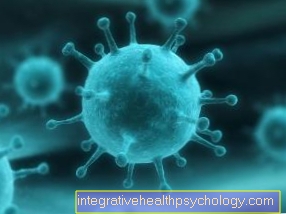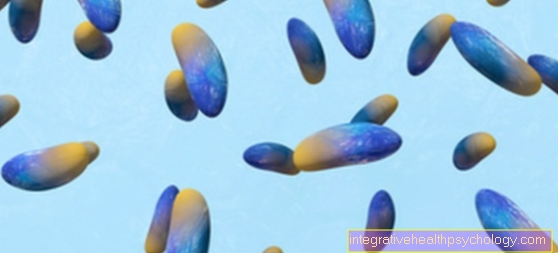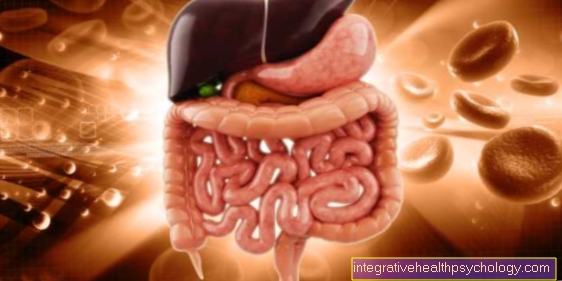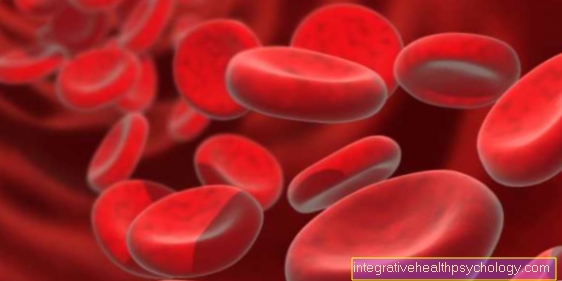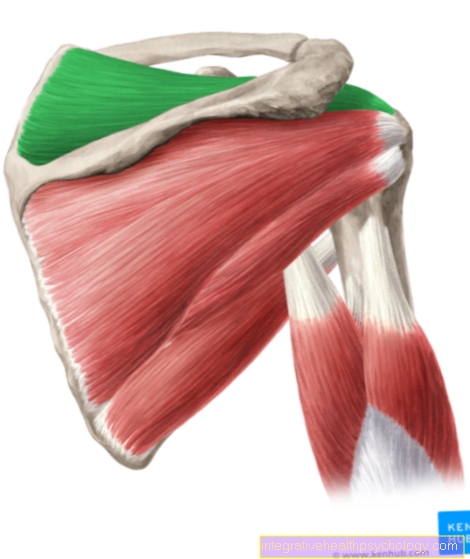Chemotherapy for colon cancer
introduction
In addition to surgical removal and radiation, chemotherapy for colon cancer represents the third important pillar in the treatment of cancer.
Chemotherapy is a mixture of different drugs, so-called cytostatics, that are administered to the patient in several stages over a longer period of time. They are designed to specifically identify and kill malignant cells based on certain cell properties.

When do you need chemotherapy?
The fields of application of chemotherapy are diverse. In cancer of the colon, it is mainly used in advanced stages after the operation as so-called “adjuvant chemotherapy”.
This chemotherapy can be necessary from stage 2 of the disease if the operation cannot guarantee the complete removal of the cancer or the cancer has already infiltrated too many layers of the wall and lymphatic tracts of the intestine. The benefit of chemotherapy is to kill undetected cancer cells in the body so that recurrences in the intestine or other organs are less common.
Chemotherapy can also be used to alleviate symptoms in so-called palliative therapy, in which a cure cannot be assumed.
In rectal cancer, a cancer of the rectum, chemotherapy can be carried out together with radiation therapy even before the operation. The aim of this is to shrink the tumor, make surgery easier, and reduce recurrence of tumors in the intestine.
- Colon cancer therapy
- Colon cancer surgery - everything you need to know
Which chemotherapy is used?
The choice of the exact chemotherapeutic agent therefore depends on factors such as the tumor stage, the aggressiveness and nature of the tumor, the patient's age and condition, as well as individual tumor molecules, which can vary among the patient.
As with radiation, the goals aimed at with chemotherapy can also vary. In treatment with curative intent, chemotherapy can take on different tasks before and after the operation. Palliative chemotherapy, which does not aim to cure, can also alleviate symptoms and possibly extend survival.
Read more on the topic:
- Life expectancy in colon cancer
- Radiation therapy for colon cancer
The different chemotherapy drugs for colon cancer
The chemotherapy drugs are also known as cytostatics. The name includes their property that they stop the growth of cancer cells and kill them. The best-known cytostatics that are used in the treatment of colon cancer are:
- 5-fluorouracil
- Oxaliplatin
- Folinic acid.
The combination of these drugs is the most common treatment regimen known as adjuvant chemotherapy. This is performed after an operation with the aim of killing undetected cancer cells in the body and making the cancer less likely to recur.
Furthermore, antibodies are increasingly used in the treatment of colon cancer, which should enable a more targeted attack on the cancer cells. Their best-known representatives are:
- Bevacizumab
- Cetuximab
Read more on the subject at: Chemotherapy substances
How long does chemotherapy last?
Chemotherapy is carried out over several cycles. There are recovery phases between the individual cycles in order to give the body, which is also attacked by chemotherapy, opportunities to regenerate.
The exact intervals depend on the individual therapy planning and the chemotherapeutic agents used.
In many cases, chemotherapy is administered over a period of 1-2 days, followed by around 2 weeks of regeneration. Each dose is given intravenously and can take several hours to complete. In total, chemotherapy can last about 4-6 months.
Read more on the subject at: Conducting chemotherapy
Typical side effects of chemotherapy for colon cancer
Chemotherapy drugs attack cells that divide quickly and have properties similar to cancer cells. Often the body's own healthy cells are also damaged, which can lead to various side effects. The main side effects of chemotherapy are:
- fatigue
- nausea
- Vomit
- diarrhea
- fever
- Changes in blood count
- reduced general condition.
By preventing rapid cell division, mucous membranes in particular are affected, which can cause the following side effects:
- Redness
- Pain
- Swelling
- Inflammation of the mucous membranes
- easy bleeding
Read more on the subject at: Chemotherapy side effects
Chemotherapy diarrhea for colon cancer
In the intestine, chemotherapeutic agents can damage the inner intestinal mucous membranes.
The drugs inhibit the division of the mucous membrane cells, which can lead to inflammation and various symptoms. Often diarrhea occurs, and more rarely constipation can be the result.
During this time, particular attention should be paid to diet, as this can have a strong influence on digestion. The meals should not be too rich or too fatty. Low-fiber, light, and low-fat diets should be given priority. Frequent small meals can also have a positive effect on digestion.
Nausea during chemotherapy for colon cancer
Nausea is one of the most common symptoms of chemotherapy for colon cancer. It can occur for a number of reasons. Here, too, damage to the mucous membrane of the stomach and upper intestinal region can be responsible. The irritation of the mucous membranes and slight inflammation inside the digestive tract releases certain hormones that not only reduce appetite, but can also cause nausea and even vomiting.
The symptoms are triggered directly at the so-called vomiting center in the brain. Various drugs can already be taken prophylactically to prevent nausea from developing in the brain. Nausea is still an important and common symptom today, but there are many good drug therapy options. In the course of chemotherapy, so-called "anticipatory nausea" can develop. It is the result of conditioning (learning a specific response to a stimulus) through previous symptoms, so that patients develop nausea just by looking at the chemotherapy drug.
Also read our topic: Anti-emetic drugs for nausea and vomiting
Hair loss during chemotherapy for colon cancer
Some of the chemotherapy drugs can cause hair loss. Again, this is due to the property of the drugs that they attack cells that divide quickly and frequently. This also applies to the hair root cells, so that they die a few weeks after the start of chemotherapy and lead to progressive hair loss.
Not all chemotherapeutic agents have an effect on the hair root cells; this should be discussed with the doctor beforehand. As a rule, hair grows back after the end of chemotherapy.
Read more on the subject at: Hair growth after chemotherapy
What can be done to avoid the side effects?
The side effects of chemotherapy are closely related to the effects. A particularly effective and strong effect on cancer cells is often associated with many side effects, since many foreign and endogenous cells are attacked equally.
The chemotherapy dose can therefore also be reduced to reduce the side effects. In addition, the body should be given enough rest during the strenuous therapy phase in order to avoid side effects. With drug prophylaxis Mucosal inflammation, nausea and vomiting can still be treated well. A low-fat, light diet in frequent and small portions can also make symptoms such as diarrhea and nausea more bearable.
In general, if the side effects are too severe, you should definitely consult the attending physician in order to change the therapy if necessary.
What can you do if the chemotherapy doesn't work?
In the treatment of colon cancer, chemotherapy is used in most cases when all visible parts of the cancer have already been surgically removed. The subsequent chemotherapy reduces the risk of recurrence, but recurrences can still occur years later, especially in advanced stages.
In the treatment of rectal cancer, however, chemotherapy can also take place before the operation. If this does not result in a noticeable reduction in size of the tumor, radiation can also be carried out.
If the chemotherapy does not achieve any success, it can be stopped in order to subsequently initiate an operation or palliative therapy. A switch to other chemotherapy drugs can also be attempted.
Read about this too Radiation therapy for colon cancer

